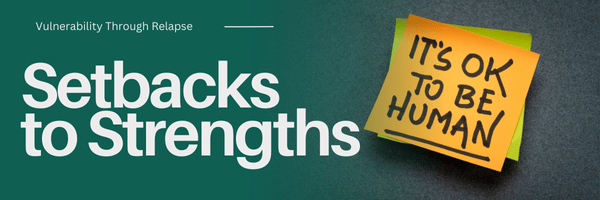Vulnerability Through Relapse: Turning Setbacks into Strength
By: Krystine Poindexter
Recovery from addiction is a journey filled with progress, challenges, and moments of vulnerability. One of the most difficult aspects of this journey is experiencing a relapse. While it can feel like a failure, relapse is not the end; it is a part of the process that many people face. What truly matters is how we respond to it. Whether the relapse lasted one day or one year, whether you had five days or ten years of sobriety, you can recover, rebuild, and continue forward.
Understanding Vulnerability Through Relapse
Vulnerability is about being open to emotions, open to learning, and open to growth. When a relapse occurs, it is easy to fall into guilt, shame, or self-doubt. However, these emotions, if embraced constructively, can serve as tools for deeper self-awareness and resilience. A relapse does not erase the hard work put into recovery. It does not erase the progress, the achievements, or the strength that carried you through before.
Relapse can happen for many reasons — disconnecting from the basics and the things that kept you sober, stress, trauma, unexpected life events, or even the current economic struggles that weigh on many. But instead of seeing relapse as failure, it should be seen as a moment to reassess, to re-engage with support, and to remind yourself why you started this journey in the first place.
The Importance of Perspective After Relapse
While relapse can feel like a setback, it is essential to remember that recovery is not about perfection —it is about persistence. Some key reminders for navigating vulnerability through relapse include:
- Recovery Is a Lifelong Journey – One misstep does not define your entire progress.
- You Are Not Alone – Many people experience relapse, and there is a strong recovery community ready to support you.
- Every Day Counts – The days, months, or years of sobriety before relapse still matter. They prove you are capable of healing.
- Self-Compassion is Key – Shame and guilt can be barriers to moving forward. Acknowledge them but do not let them define you.
- Use Relapse as a Learning Opportunity – What led to this moment? What can be changed to prevent it in the future? Growth comes from reflection.
Moving Forward After Relapse
Recovering from relapse requires courage and action. Here are ways to turn vulnerability into strength:
- Reach Out for Support – Whether it’s a sponsor, counselor, or support group, reconnecting with your recovery network is crucial.
- Recommit to Your Recovery Plan – Adjust strategies to address the triggers that led to relapse.
- Focus on Your Achievements – Reflect on the progress made before relapse and use it as motivation to move forward.
- Practice Self-Forgiveness – Beating yourself up over relapse does not help. Self-compassion is necessary for healing.
- Remember: Relapse is a detour, not a dead end. You can and will recover again.
At Second Chances Addiction Recovery Center, we believe that every step forward in recovery counts, even after a step back. Your journey does not end with relapse. It continues with renewed strength, understanding, and the courage to keep moving forward.
If you or a loved one needs help, contact our 24/7 information and intake line at 833.780.3088. Second chances are only a call away.


Recent Comments